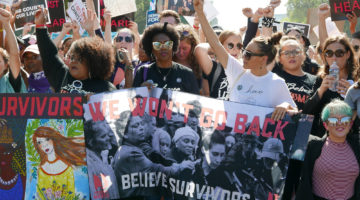By Alexandria Malone
After my last Latino Voices article, “Create Support for Latino Victims of Sexual Assault” was published, within a day I started corresponding with two university officials: Jo Harvey, a prevention coordinator in the Office of Student Conduct, and Denise Cordova, the Title IX coordinator on campus. Both of these women expressed sincere sympathy for survivors and a strong desire to make students aware of the services available to them.
I do believe that the university is actively trying to prevent sexual misconduct and assault on campus. Cordova and Harvey both stressed that the university’s focus when dealing with sexual assault is the survivor. If you or someone you know has been sexually assaulted on campus, there are resources for you, whether or not you want to go forward with a criminal investigation. The primary actions will be focused on making sure the survivor gets the medical attention and counseling services he or she needs.
There seems to be an unfortunate circular logic when it comes to reporting sexual assault and the services a survivor can receive. A survivor may think that he or she won’t be believed and will question the worth of reporting or getting any treatment. Therefore, the services may become inefficient by the simple fact that they are not being utilized.
Another fear both Harvey and Cordova addressed is the social implication of accusing someone who is a friend or acquaintance. You can choose to remain anonymous and just receive the medical and counseling services. The university can move your classes and assign you an escort to and from classes.
If you choose to name your assailant, you can remain anonymous. The university keeps that information on file with the Title IX office, so that if that person comes up in another investigation, there is proof of previous offenses. This means that you must be named, but it also means that you are not alone.
If you choose to move forward with an investigation, you will have to be named, but the university can move the alleged assailant’s classes and put a no-contact order into effect, which is strictly enforced on campus. The Office of Student Conduct and Title IX both work closely with the police department and they will guide you through the entire process.
It’s important to know that the university does not work like the criminal justice system. The institution does not need to prove guilt beyond a reasonable doubt; they gather evidence and make a decision based on that evidence. According to Cordova, there were 14 cases of sexual assault brought to the Title IX office in 2014, and only one of them did not present enough evidence to bring disciplinary action.
Again, these are not criminal charges, but violations of the university’s code of conduct. University action can be sought without involving the police, if that is what the survivor chooses. Cordova blatantly stated that university officials do not discourage students from reporting to the police. The reality is that some cases of sexual assault fall within a legal gray area and trials can be traumatizing. Even the university’s investigation can be distressing to the survivor, which is why the focus is on getting help for the survivor. But the university will follow the wishes of the survivor as closely as they possibly can.
There are initiatives in place to increase awareness of the services available on campus. Incoming freshmen and transfer students learn of the services available to them during their respective orientations. All university employees, students and non-students, go through training on how to deal with sexual assault.
However, the university can do more. University officials cannot expect that incoming students, in addition to remembering all of the other information given to them at orientation, will remember that someone once told them that the Title IX office deals with sexual assault complaints. Saying it once is not enough to truly raise awareness.
And what about the students who entered the university before sexual assault prevention became part of orientation two years ago? I consider myself to be an active student who is aware of the resources available on campus, yet if someone had asked me a few weeks ago where to go to report a rape, I would not have known the answer.
The university needs more students who are willing to act as bridges into their respective communities on campus. Not every demographic reacts the same way to sexual assault, so the prevention efforts should vary in the same way. Age, gender, sexual orientation, race, culture, academic major — there are a wide range of factors, and two women and their associates are not enough for a campus of 19,000 students.
The university can’t do anything if survivors do not report. We as a community need to work to make reporting acceptable and we can only do that if the university increases its efforts in making students aware of the processes and services associated with reporting.
Alexandria Malone studies business. She can be reached at dcoffey@sagebrush.unr.edu and on Twitter @TheSagebrush.












